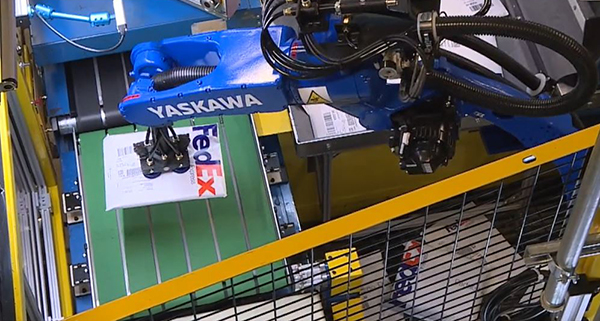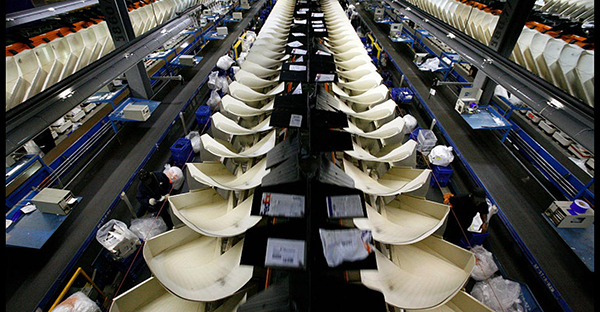Seeking a career?
Okay, so you’re toe dipping in robotics as a possible career choice, but still wary about the deep end of the pool. That’s understandable, but you can’t dawdle for too long.
A good way to flatten the arc on decision making is to speak about your indecision with someone who has made the same choice that you are now contemplating, and is glad he did.
That someone is Aaron Prather, who says of himself: “My current title is Senior Technical Advisor [FedEx], but the real title is Livin’ the Dream!” FedEx is one of the largest logistics companies in the world, and Aaron has been with them for twenty-five years. That’s definitely a career’s worth of work…and he still looks good. One of Aaron’s best traits is his ability to plainly yet eloquently explain his passion for what he does and how you might profit from following a similar path. Experience wonderfully explained is a good description of his talent. Besides, anyone with the biblical name of Aaron, which translates as “mountain of strength”, might well be worth listening to.
One of Aaron’s best traits is his ability to plainly yet eloquently explain his passion for what he does and how you might profit from following a similar path. Experience wonderfully explained is a good description of his talent. Besides, anyone with the biblical name of Aaron, which translates as “mountain of strength”, might well be worth listening to.
He’s the kind of guy you want to take to dinner. Seriously. Don’t worry, he’s a light eater and splits the tip.
With scads of self-written articles about his passion all over the Internet, I’ve excerpted from a few to help build a bit of a portrait of this interesting man, the things that drive him, and his communication skills when writing about them.
The man behind the words
“I am the Senior Advisor for the Technology Research and Planning team at FedEx Express. Our team’s mission is to seek out and evaluate new technologies to see if they are ready to enter the FedEx network. This can be anything from robotics to sensor-based logistics to drones.
“I get to work on many of FedEx Express’ R&D projects that can run the gamut from Robotics to RFID to Drones to Advance Sensors to Robotics. Robotics… is where I love to spend most of my time. From working on a robotic arm for Pick and Place applications to working with a mobile robot for Material Handling applications, I really love working with our new mechanical employees.
“If not at my desk, I can be found at our R&D facility near the Memphis Hub or in one of our operations working on a new technology and preparing it for deployment. There is also the possibility that I am at a conference speaking about robotics, automation, and workforce development.”
“My role is to advise our leadership and fellow team members on many of these new technologies. This means that I spend a big part of my time talking and working directly with vendors and organizations…to not only make these technology discoveries, but to figure out if and where they can find a home in a company like FedEx.”
Q: In your LinkedIn bio, you highlight robotics because this is where you “love to spend most of your time”. Why do you have a passion for robotics?
“Being a kid that grew up on Star Wars and Buck Rogers, I have always been in awe of robotics.
“Even today, I totally geek out when I see a robot pick up a package, take a part out of a CNC machine, or navigate through one of our sort facilities to deliver pallets of freight. It is still something magical to me and shows what is possible. It is that possibility that drives my passion for robotics.
“Robotics can help in so many places. We can free up humans from these monotonous tasks and move them to other more meaningful work. This can increase productivity and worker safety. This is ultimately where my passion for robotics come from – their ability to help mankind advance and be safe while doing it.”
“What skills do I need to be successful in robotics?”
“I know I have heard this question hundreds of times. I know my fellow robot community members have also heard it numerous times. Recently, Erik Nieves, Founder of PlusOne Robotics gave probably one of the best answers I’ve heard:
“You said ‘skills’ which is right on. Go learn to weld, paint, run a press brake, etc. Take a job at a factory. Remember that A LOT of robotics is wrapped up in manufacturing processes. You will be a much stronger candidate if you can mate your education in robotics with skills in ‘what robots actually do.’”
“His statement hit me right between the eyes, because it is so true based on success stories I have come across. If you want to get into robotics, you need to first have a solid understanding of the tasks that robots are doing and the skills that require you to do those tasks. Having personally worked numerous jobs in logistics, it is not surprising that I have become somewhat of an expert in robotics when it comes to those deployed in logistics.
“This also points to why we are seeing so much success with programs that teach both manufacturing skills and robotics. That point was made clear when MIT researchers said that even though CNC machines met the criteria for a “robot” under the International Federation of Robotics’ definition, they were not going to count them in a recent robot survey because CNC machines could not be repurposed to do other tasks like pick-and-place applications by simply changing their end-effectors.
“So should the real question be, “What transferable skills do I need to be successful in robotics?” Transferable skills are any skills you possess that are useful to employers across various jobs and industries.
“When thinking about transferable skills, many first think of things like Adaptability, Teamwork, and Communications skills. However, if we are really going to get into skill sets that really play into robotics, it makes more sense to discuss those skills that Erik listed earlier.”
A piece of paper
“I am a proud holder of two degrees – a Bachelor’s and a Master’s. However, I can state that every day they become less useful in my current job.
“It is really my skills that were completely separated from my formal college education that have moved me forward in my career. My first real career break at FedEx came over 20 years ago because I was one of the few people in the operations that knew how to use a little program known as Excel. I had learned Excel on my own. My first exposure to Excel at the University level was when I took a Finance class in my Master’s work.
“This again is why Erik’s comments were so resonant. Having a piece of paper is nice. However, unless you are getting some real-world hands-on experience and creating the skills that roboticists need, you are shorting yourself. Can one really be a programmer, if they have never actually written code? You may do okay, but are you truly marketable to an employer versus someone who has?”
Table for two?
Check out Aaron at his LinkedIn page. Aaron Prather. I think that you’ll be inspired by what you find there.

